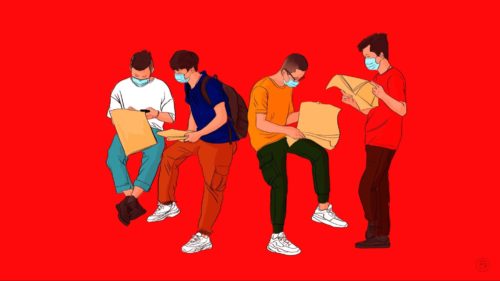Boomerang kids: Why China’s young professionals are moving back with mom and pop
Exhausted by the rat race, more and more young Chinese professionals are choosing to move back in with their parents and become "full-time offspring." Are they checking out of society or finding new ways to attain fulfillment?

Angela Qian has two different ways of explaining why she, at age 29, still lives with her parents.
In the first version — the one she prefers — she’s making a sensible financial decision while trying to figure out what to do with her career. In 2017, after graduating with a bachelor’s in public administration from Southwest Jiaotong University, a recognized college in Sichuan province. Qian moved to Shenzhen, working a string of jobs in the city’s booming tech sector that left her feeling “financially and professionally unfulfilled,” she told the China Project.
After quitting her job as a human resources assistant, Qian is now back in her old bedroom at her parents’ house in her hometown of Panzhihua. She said she’s “helping around the house” while striving to land a government job. “I’m not just mooching off of my mom and dad,” Qian, who describes herself as a “full-time daughter,” said. “I run errands for my family and satisfy my parents’ emotional needs. It’s like a real profession.”
But in the second version of her story — the less optimistic one — Qian admits that her situation has been a point of intense scrutiny at family gatherings. Relatives presume she is lazy and “lacks motivation,” she said. “Thankfully, my parents are pretty open-minded and would always stick up for me whenever I am visibly upset about those comments. But I understand why I might seem like a loser to some people. It’s been almost two years since I moved back and I barely made any progress on identifying my long-term goal.”
Young adults in China, especially those who have attended college and are from less prosperous metro areas, are often encouraged to leave their hometowns and move to top-tier cities where they can build a life and career away from their parents. Traditionally, there’s a stigma associated with living with one’s parents. Those who do so are criticized for kěnlǎozú 啃老族, “chewing the old.”
But in a new twist, more young adults like Qian are returning home to live — and finding that their parents are receptive to it. These people are rebranding themselves as “full-time offspring,” suggesting that they are fulfilling their duty of filial piety in exchange for living rent-free.
“This phenomenon itself is not new,” Biao Xiang, a professor of social anthropology at the University of Oxford, told The China Project. “Reversed inter-generational asset transfer (from elderly parents to adult children) in both savings and labor contributions (e.g., grandparents looking after grandchildren) has been very important for young adults to form their own families.”
A growing trend
“I’m definitely not alone in doing this,” said Qian, who has reconnected with a few friends from her hometown and found that “some of them were kind of in the same boat.”
“I had this one childhood friend who was always at the top of her class and eventually got admitted to Tongji University,” Qian said. “When I met up with her at a local hotpot restaurant earlier this year, she told me she was sort of doing the same thing. I was genuinely shocked to hear that.”
For Qian, before taking other factors into account, the decision to return home made financial sense first and foremost. At her last corporate job at a tech start-up in Shenzhen, Qian made around 7,000 yuan ($1,000) a month, half of which went toward rent. Although she barely saved any money, she loved her life in the city, often known as the Silicon Valley of China, where new, exciting restaurants and boutique shops cropped up in her neighborhood “at a speed almost impossible to keep pace with,” she said.
But when the COVID-19 pandemic hit, forcing most businesses to shut down and resulting in a paycut, Qian had to “redo a series of financial calculations,” which led her to pack and leave. “I didn’t get to enjoy a lot of the outdoor activities I liked. I spent a lot on takeouts and then found myself eating alone in my shoebox apartment. It was depressing, ” she lamented, adding that before she made the decision to leave, she found herself in a state of deep doubt. “I kept asking myself: Is it worth it? How badly do I want to live here?”
Qian said she was initially hesitant to propose the idea of returning home to her parents, fearing that “they would be disappointed and saw me as a failure.” But to her surprise, Qian’s parents welcomed her with a great deal of enthusiasm and support.
Huang, 33, graduated from a prestigious university in Beijing in 2013 and climbed up the corporate ladder at an ecommerce conglomerate, from an engineer to project manager. Despite the enviable pay and glamorous perks offered by the company, Huang, who requested to only be mentioned by his last name, said that he was vexed by his working situation, which “involved long hours, caused a lot of anxiety, and constantly pushed him to do more and do better.”
“It’s like playing a video game and there are a string of bosses to defeat. Whenever I wanted to pat myself on the back for how much I’ve achieved, I couldn’t stop thinking about how much more I still needed to do.”
After his job went virtual because of the pandemic, Huang, single and struggling to find love despite being fixed up on blind dates routinely, rarely left his apartment, which exacerbated his sense of loneliness and doubts about the future. “There’s this societal expectation of me going down the path of buying an apartment, getting married, having kids, and living this typical upper-middle-class lifestyle,” he said. “It’s like playing a video game and there are a string of bosses to defeat. Whenever I wanted to pat myself on the back for how much I’ve achieved, I couldn’t stop thinking about how much more I still needed to do. To hit those milestones, I have to work harder and probably still need financial support from my parents.”
Physically burned out and mentally drained, Huang called it quits earlier last year and moved back to Luoyang, an ancient city in Henan province, where he spent the most years of his adolescence. Like Qian, Huang’s homecoming was greeted with comprehension and encouragement from his parents. “They saw how much I struggled mentally and agreed that it was the best decision for me,” he said.
Reluctant to give up on his career in Beijing, Huang originally saw the move as a temporary fix to his situation. But now he’s considering making his new living arrangement permanent, as he has been “excelling at the new job as a full-time adult son,” he said.
A typical day in Huang’s new life now starts with him cooking breakfast for his parents, who are a few years away from retirement. He performs a variety of chores including housekeeping, laundry, grocery shopping, meal preparation, and walking the family dog. Almost every day, Huang drives to a nursing home to visit his grandparents, who he used to see only about twice a year. He is also the family’s chief entertainment planner, scheduling weekend activities and sometimes long trips.
“Apart from the increasing economic pressure for living in large cities and the decreasing job opportunities, some of the parents — typically born in the 1960s — are also becoming more open-minded about their children’s choice of lifestyle,” Biao, the professor of social anthropology, said. “The fact that most of these children are the family’s only child also makes it desirable for parents to have them ‘back’ to live together, at least for a while.”
In recognition of his dedication, Huang’s parents started paying their only child 3,500 yuan ($500) a month last November. “It seems transactional, but I know there’s more to that,” Huang said. “There’s a tremendous amount of value in the emotional support I’m providing by living with them. They don’t say it out loud, but I can tell from their faces.”
“For educated parents, having the only child back to enjoy life together may be better than contributing their life savings to buying properties to get the children married,” Biao said. However, he stressed that Chinese parents’ expectations for their children are complex.
“Most Chinese parents still want their children to succeed. If you have a grown-up daughter who has a Ph.D. in medical science, busy with her work, not interested in getting married, and wishes to live with you, would you regard this as a failure or an achievement?”
A privilege that isn’t for everyone
While it may not seem apparent, returning home is actually a privilege and a reflection of a family’s financial stability, explained Fang Xu, a lecturer at the University of California, Berkeley, who has done an extensive amount of research on language, cultural identity, and public policies in urban China. According to Xu, people like Qian and Huang had the option to move back in with their parents because they could afford to do so after making minor adjustments to their financial priorities. But for young professionals who come from low-income families, they have to stay in the workforce to make ends meet — sometimes not just for themselves, but for parents who rely on their financial support.
“It’s especially tricky for young people with rural backgrounds. When a student in the countryside gets into a college in, say, Beijing, that brings glory to their family and the village they came from,” she told The China Project. “Going back to their rural home is off-limits as there’s no job opportunities for them in their hometowns. They have to hang around in big cities no matter how hard it gets.”
China news, weekly.
Sign up for The China Project’s weekly newsletter, our free roundup of the most important China stories.
Biao agrees, noting that youth in rural regions have always been boomerang kids — those who move back in with their parents — as their family can’t help them settle in urban areas. “Rural-urban migrants return to their parents periodically till they are in their mid-40s or so,” Biao said. “Thus, those at the bottom of society — the number of which is huge, I must stress — are default boomerang kids.
“But of course, they hardly catch public attention. Among the urban residents, many who are poor had to live with their parents even though they worked. They haven’t received much attention. Those who say having boomerang kids is a ‘new’ lifestyle, a new choice, is the upper-middle class.”
“It’s especially tricky for young people with rural backgrounds…Going back to their rural home is off-limits as there’s no job opportunities for them in their hometowns.”
Although their financial anxiety has eased and familial bonds have strengthened, Qian and Huang admit that a return home after living away comes with problems. One of the main challenges for Qian is the toll it has taken on her social life, as she feels “obligated to spend as much time as she can at home to keep the parents’ company and be a good daughter,” she said.
Huang said that his parents constantly drop not-so-subtle comments about “hoping to be a grandparent before they die,” and are “crazy about setting up blind dates” for him. “I have to prioritize their feelings above mine, and I guess that’s the price I have to pay for the comfort I’m getting,” he said.
An extension of “lying flat”
Another more complicated issue they have to wrestle with is how to make peace with their decision to opt out of the rat race. A nihilistic mentality when it comes to professional achievement and social mobility is the core ethos behind “lying flat” (躺平tǎngpíng), which emerged two years ago as a rallying cry of sorts for disillusioned Chinese youth who are unhappy with the culture of long working hours, high housing prices, and an unequal distribution of resources within society.
The idea stemmed from a new now-deleted post on Tieba, a Chinese forum similar to Reddit, and gained traction quickly across social media, inspiring a groundswell of memes and discussions. Although authorities attempted to shut down the discourse, fearing that it would impede Chinese consumption and growth in the long run, the message resonated with ordinary young Chinese.
To make things worse, the competition for stable, decently-paid jobs has grown even more cutthroat in the past year. In July 2022, the youth unemployment rate reached 19.9%, the highest since Beijing started publishing the index in January 2018, when it was 9.6%. A record number of college graduates are positioned to seek employment this year, as many Chinese companies — including big tech firms like Tencent and Xiaomi — have cut jobs, slashed salaries, or implemented hiring freezes in the face of a an economic slump that has been going on for several years, exacerbated by the pandemic.
Qian is acutely aware of her unconventional situation. She said before she left the workforce, she noticed many peers in her company shared the same kind of dissatisfaction she had about the workplace and their personal life. “But they were worried that if they quit their current jobs, they wouldn’t be able to find another one in this labor market,” she said.
According to Biao, moving back home is only one response to the increasing work pressure and declining economic opportunities in China. “A much more common response to this situation is young people’s obsession with job security,” he said. “There’s a popular saying in the country right now that goes, ‘At the end of the universe is the examination for civil service jobs,’ meaning that many young people now think having a job in government as the highest goal in life, and are willing to invest time and energy in the extremely competitive exams to get one.”
Earlier this year, a record 7.7 million Chinese youths sat for the civil service exam, vying for more than 200,000 government jobs at the national and provincial level, per CNBC. “It is hard to imagine that anybody in their mid-20s or early-30 are passionate about office clerk jobs for life,” Biao said. “But they are fighting for such jobs at all costs because they provide security. An opening of one entry-level official position normally attracts tens of thousands of applications.”
Qian, for now, expressed no urgency about moving out of her parents’ home. “I don’t regret moving back home because it was a necessary decision for my mental health at the time,” she said. But she admits that she is not entirely immune to the widespread anxiety about employment and career progression, which has become a central theme in the posts shared by her old friends in the workplace.
“I would be lying if I say I never wonder what I’ve been missing out on and how I could get back on my feet again,” she said. “I’ve been studying for the civil service exam and we’ll see how that goes.”






